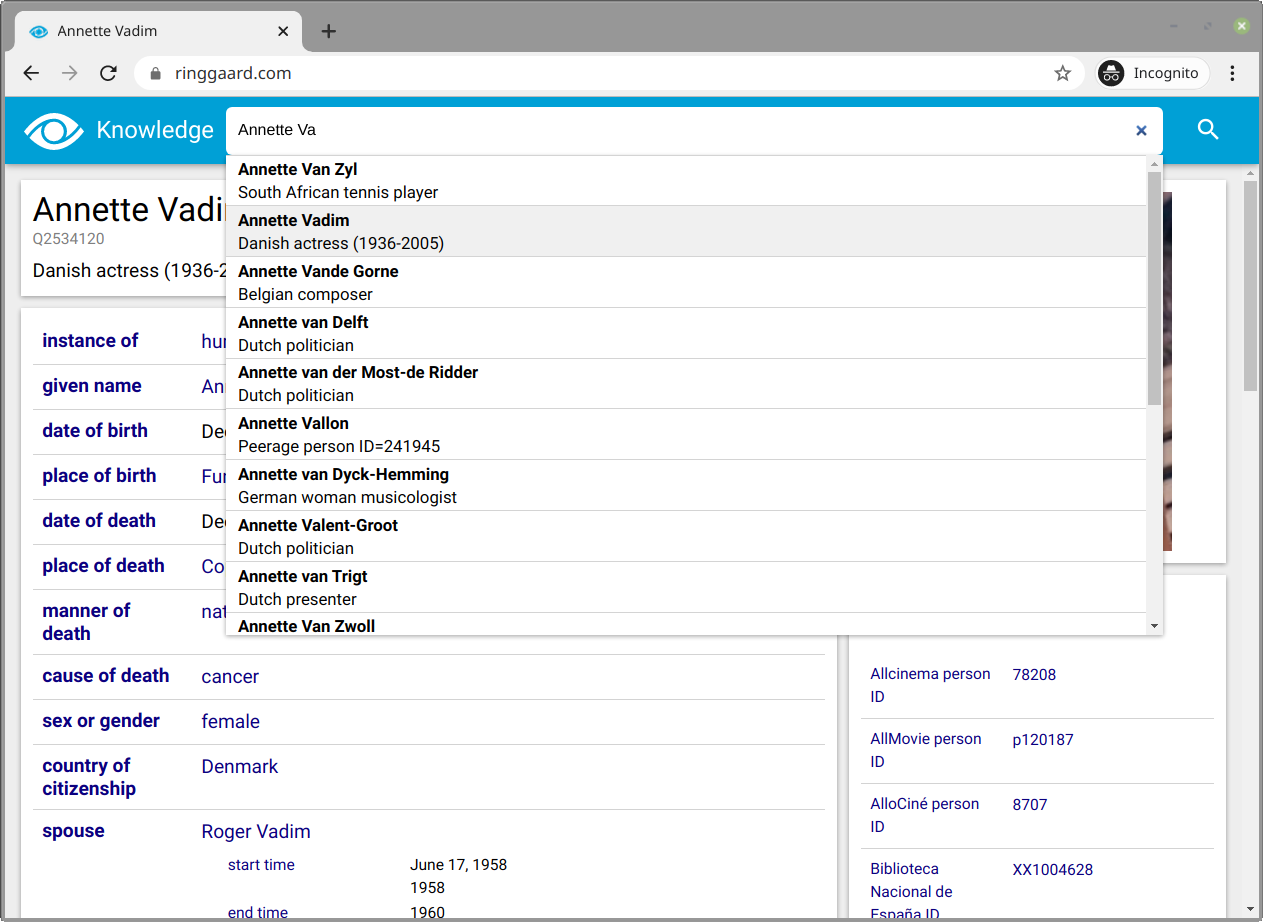Knowledge base
KnolBase is a federated knowledge base that contains approximately two billion facts about 100 million entities. KnolBase uses the in-memory SLING frame store for representing knowledge. Every day a new knowledge base is built from a Wikidata live-feed as well as a number of other information sources:
- Wikipedia (aliases, photos, infoboxes, summaries, categories, popularity, 30 languages)
- CVR (Danish Central Business Register)
- Reddit (celebrities and photos)
- Twitter (photos)
- IMDB (photos)
- Global LEI index (companies)
- FactGrid (research database for historians, optional)
- KnolCase (published case topics)
KnolBase is built nightly using a pipeline similar to the one descriped here, but it uses the reconcile_items task instead of fuse_items to build the knowledge base. This requires a number of additional data set to be build from external sources, making this much more complex to run. Instead of building this yourself, it is recommened downloading the prebuilt KnolBase knowledge base from ringgaard.com using this command:
sling fetch --dataset kb,nametab,phrasetab
Browser

You can use the knowledge base browser for viewing the following information in the knowledge base:
- Item id, name, and description (click the Wikidata QID to navigate to the Wikidata page for the item)
- Summary from Wikipedia (click on the Wikipedia link to navigate to Wikipedia page)
- Item properties (click property value to navigate to item)
- Photos (click on photo to view gallery)
- Cross references (click reference value to visit external site)
- Wikipedia categories
If you type or paste a name or alias for an entity in the search field, it shows the items matching the query. Clicking an item from the search list will show the item, or press Enter to show the first item in the search list.
The following types of searches can be performed:
-
Prefix search
By default, the browser do prefix matching finding items with names or aliases that starts with the query string. -
Full match
If the query ends with period, only items with names or aliases that completely match the query string are shown. -
Keyword search
You can do keyword matching by adding a question mark to the end of the query. This searches for matches in the names, aliases, description, summary, and a number of other properties. Keyword search also searches for offline items, e.g. articles, genes, chemical compounds, stars, and galaxies. The order of the search terms are not important. Only items matching all search terms (except for stopwords) will be matched. Keyword search also searches over a number of different languages, currently English, Danish, German, French, Spanish, and Italian. -
Identifier search
You can search for items by their item id(s), e.g. Wikidata QID. An item can have multiple ids, if it has been merged during the reconciliation process. -
References search
Items can be looked up by their external ids. These are identifiers for the item in other systems. If an item does not have a Wikidata QID, it is assigned ids based on its external ids, e.g. an item with CVR number 41641908 will have P1059/41641908 as its id. You can see the current list of indexed identifiers here. You can also use mnemonics to search cross-referenced properties, e.g. searching for "cvr:41641908" will find the item with CVR number 41641908. -
URI search
In the knowledge world, URIs are often used for identifying entities, e.g. in RDF and JSON-LD. You can look up items by their URIs, e.g. "https://schema.org/Person" is a URI for human. Items with exact match, equivalent class and equivalent property are indexed. KnolCase also uses a URI mapping to map URI prefixes to cross-reference properties in the knowledge base.
W3C Reconciliation Service API
KnolBase has a W3C Reconciliation Service API so it can be used as a reconciliation service for OpenRefine by specifying https://ringgaard.com/reconcile/ as the service endpoint. The KnolBase reconciliation service is much faster than the default Wikibase reconciler because of the SLING in-memory architecture. The KnolBase reconciliation service supports the following APIs:
- Reconciliation service (matching names to items in the knowledge base)
- Preview service (preview panels for items)
- Suggest service (suggest entities, types, and properties)
- Data Extension service (extend rows with data from the knowledge base)
External id search mnemonics
The following search mnemonics are supported:
| case: | SLING case number (PCASE) |
| cvr: | Danish CVR company number (P1059) |
| cvrid: | Danish CVR unit number (PCVR) |
| coh: | UK Companies House company ID (P2622) |
| sec: | US SEC Central Index Key (P5531) |
| irs: | US IRS Employer Identification Number (P1297) |
| abn: | Australian Business Number (P3548) |
| acn: | Australian Company Number (P3549) |
| cnpj: | Brazilian CNPJ (P6204) |
| siren: | French SIREN number (P1616) |
| kvk: | Dutch KvK company ID (P3220) |
| okpo: | Russian OKPO ID (P2391) |
| ein: | Swiss Enterprise Identification Number (P4829) |
| oc: | OpenCorporates ID (P1320) |
| lei: | Legal Entity Identifier (P1278) |
| imdb: | IMDB ID (P345) |
| tw: | Twitter username (P2002) |
| fb: | Facebook ID (P2013) |
| ig: | Instagram username (P2003) |
| sr: | subreddit (P3984) |
| tt: | TikTok username (P7085) |
| of: | OnlyFans ID (P8604) |
| vimeo: | Vimeo identifier (P4015) |
| pb: | Playmate ID (P5346) |
| ph: | Penthouse ID (P6290) |
| babe: | Babepedia ID (PBABE) |
| vef: | VEF thread ID (PVEF) |
| iafd: | IAFD female performer ID (P3869) |
| viaf: | VIAF ID (P214) |
| mid: | Freebase MID (P646) |
| kg: | Google Knowledge Graph ID (P2671) |
| fg: | FactGrid ID (P8168) |